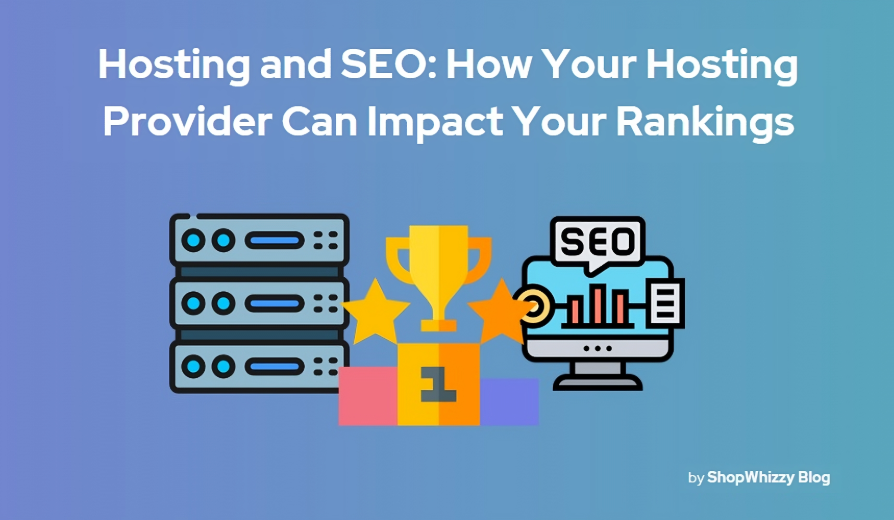Hosting and SEO: How Your Hosting Provider Can Impact Your Rankings
-

- Blog
- Jun 14, 2024
- 0views
- Reading time: 5 minutes

Introduction
In the vast digital landscape, where every website vies for attention, the selection of a hosting provider emerges as a critical determinant of online success. This document delves into the intricate relationship between hosting services and Search Engine Optimization (SEO) rankings, illuminating the pivotal role that hosting plays in shaping website visibility, user experience, and ultimately, search engine performance. From shared hosting to dedicated servers, and from VPS to cloud hosting, each option presents unique opportunities and challenges for optimizing SEO outcomes. Through an exploration of the nuances of hosting environments, readers will gain insights into how strategic hosting decisions can unlock the gates to SEO excellence and digital prominence.
Understanding the Basics of Hosting and SEO
In this chapter, we lay the groundwork for understanding the fundamental concepts of hosting and SEO. Hosting services provide the infrastructure and technologies necessary for websites to be accessible on the internet, while SEO encompasses strategies aimed at improving a website's visibility and ranking on search engine results pages (SERPs). By comprehending the symbiotic relationship between hosting and SEO, website owners can make informed decisions to enhance their online presence and reach.
Shared Hosting: The Pros and Cons for SEO
Shared hosting, a common starting point for many websites, involves multiple websites sharing resources on a single server. While shared hosting is cost-effective and easy to manage, it can pose challenges for SEO due to potential performance limitations and security vulnerabilities. In this chapter, we explore the nuances of shared hosting and discuss strategies for optimizing SEO performance within this environment, balancing the benefits of affordability with the need for effective SEO practices.
VPS Hosting: Enhancing SEO Through Virtualization
Virtual Private Server (VPS) hosting offers a middle ground between shared hosting and dedicated servers, providing website owners with dedicated resources within a virtualized environment. VPS hosting enhances SEO by offering greater control, scalability, and performance compared to shared hosting. In this chapter, we delve into the advantages of VPS hosting for SEO and discuss techniques for maximizing SEO benefits on VPS platforms, empowering website owners to achieve higher search engine rankings and visibility.
Dedicated Hosting: SEO Optimization Through Dedicated Resources
Dedicated hosting provides website owners with exclusive access to a physical server, offering unparalleled performance, security, and customization options. With dedicated resources at their disposal, website owners can optimize their SEO efforts by ensuring fast load times, high uptime, and robust security measures. This chapter explores the advantages of dedicated hosting for SEO and presents advanced techniques for leveraging dedicated server resources to enhance SEO performance, guiding website owners towards SEO excellence and digital success.
Cloud Hosting: Scalability, Resilience, and SEO
Cloud hosting revolutionizes the hosting landscape by offering scalability, resilience, and global accessibility through a network of interconnected servers. Cloud hosting enhances SEO by providing elastic resources that can scale according to website traffic and demand, ensuring consistent performance and availability. In this chapter, we examine the impact of cloud hosting on SEO, highlighting its scalability and resilience in optimizing website visibility and search engine rankings. Practical insights and strategies are provided to leverage cloud technology for SEO success, empowering website owners to thrive in the dynamic digital environment.
Page Load Speed: The SEO Impact of Website Performance
Page load speed, the time it takes for a web page to load completely, is a critical factor in both user experience and SEO rankings. Slow-loading websites not only frustrate visitors but also receive lower rankings on search engine results pages (SERPs). In this chapter, we delve into the critical role of page load speed in SEO rankings, exploring the factors that influence website performance and practical strategies for improving page load speed to enhance SEO outcomes.
Uptime and Downtime: Maintaining SEO Integrity
Website uptime, the time during which a website is operational and accessible to users, is essential for maintaining SEO integrity and user trust. Downtime, on the other hand, refers to periods when a website is unavailable due to server issues or maintenance. In this chapter, we emphasize the importance of website uptime for SEO success and offer guidance on mitigating downtime risks to preserve SEO integrity, ensuring consistent visibility and prominence on search engine results pages (SERPs).
Server Location and Geotargeting: Optimizing SEO Reach
The geographical location of servers can impact website performance, user experience, and SEO rankings. Server location influences factors such as website loading speed, latency, and regional targeting. In this chapter, we explore the significance of server location and geotargeting strategies for optimizing SEO reach and relevance. Practical insights and best practices are provided to help website owners leverage server location and geotargeting to expand their SEO reach and connect with their target audience effectively.
Security Measures: Safeguarding SEO and Website Integrity
Website security is paramount for protecting SEO rankings and maintaining website integrity. Security measures such as SSL certificates, firewalls, DDoS protection, malware scanning, and data center security help safeguard websites against cyber threats and vulnerabilities. In this chapter, we delve into the essential security measures for protecting SEO and website integrity, offering practical guidance on implementing robust security protocols to ensure a safe and secure online environment for visitors and search engines alike.
Advanced SEO Strategies for Hosting Optimization
Beyond the fundamentals of SEO lie advanced strategies tailored to hosting optimization, designed to elevate websites to new heights of visibility and prominence. In this chapter, we explore advanced SEO techniques such as structured data markup, content delivery networks (CDNs), mobile optimization, and voice search considerations. By harnessing these advanced strategies in conjunction with hosting optimization, website owners can unlock the full potential of their online presence and achieve sustained success in the competitive digital landscape.
Conclusion: Maximizing SEO Potential Through Hosting Excellence
As our journey through the realms of hosting and SEO draws to a close, it becomes evident that the choice of hosting provider plays a pivotal role in shaping SEO outcomes and digital success. From shared hosting to dedicated servers and cloud hosting, each hosting environment offers unique opportunities for optimizing SEO performance. By understanding the intricacies of hosting services and their impact on SEO rankings, website owners can make informed decisions to maximize their SEO potential and achieve enduring visibility and prominence in the dynamic digital landscape. Armed with knowledge and strategic insights, website owners are empowered to navigate the complexities of hosting and SEO with confidence, ensuring their websites stand out amidst the digital noise and soar to the pinnacle of search engine rankings and online success. By embracing hosting excellence and implementing effective SEO strategies, website owners can elevate their digital presence, attract more visitors, and achieve their business objectives in the competitive online landscape. As we conclude this exploration of hosting and SEO, let us embark on a journey fueled by knowledge and innovation, forging ahead towards new horizons of digital prominence and sustained success.
